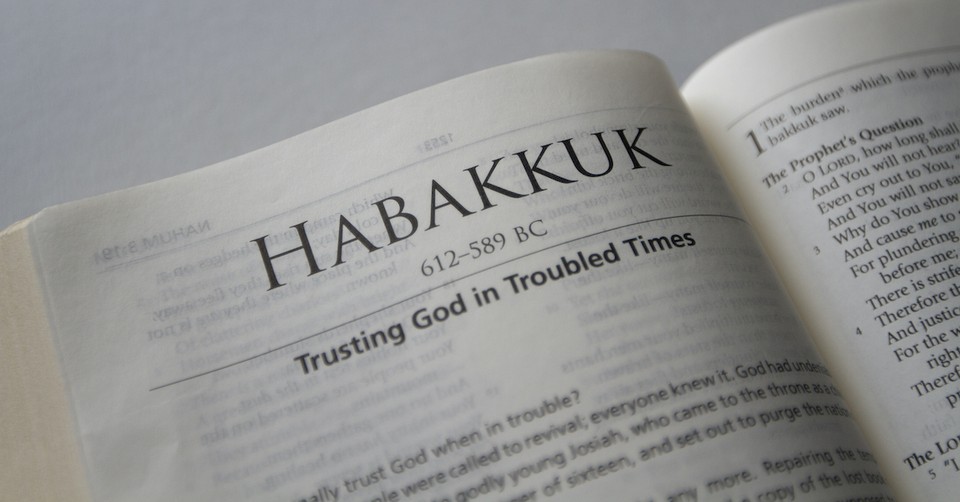6 Things to Know about Habakkuk in the Bible

Where is God when life doesn’t make sense? When it seems like the wicked are prospering? When circumstances are as chaotic as they are confusing? These were the questions swirling in the mind of the prophet Habakkuk, and the record of his prayer life as he wrestled through these questions provides a bracing and encouraging example of how to trust God in the midst of hard times that we don’t fully understand.
Who is Habakkuk in the Bible?
Habakkuk was a prophet who likely lived at the same time as Zephaniah and Jeremiah. Historians estimate he likely “prophesied a short time before the Babylonian invasions of Judah, which began in 605 B.C. Habakkuk watched with horror as the people of Judah became more and more unrighteous, but he was even more horrified when God used an even more unrighteous nation (Babylon) to judge them through the exile. God’s answers to Habakkuk’s questions provided insight and encouragement for Habakkuk and the righteous remnant in Judah, and those words preserved in the book of Habbakuk continue to do the same for believers today.
Here Are 6 Things to Know about Habakkuk and His Book:
What Was the Character of Habakkuk?
1. Habakkuk models honest, righteous prayer that asks the hard questions.
In a departure from most prophetic literature in the Bible, the book of Habbakuk is not directly addressed to God’s people; “rather, it is a dialogue, between the prophet and God” (ESV.org). The book is almost entirely a back-and-forth conversation in which Habakkuk is deeply honest with God. He asks difficult questions and struggles with reconciling what he knows about God’s characters with what God’s current actions are. He wonders why a more wicked nation (Babylon) will be able to win a victory over a less wicked nation (Judah). He cannot deduce how that is just or how that will communicate God’s character to a watching world.
You who are of purer eyes than to see evil
and cannot look at wrong,
why do you idly look at traitors
and remain silent when the wicked swallows up
the man more righteous than he? (Habakkuk 1:13)
After sharing all that is on his heart, Habakkuk says:
I will take my stand at my watchpost
and station myself on the tower,
and look out to see what he will say to me,
and what I will answer concerning my complaint. (Habakkuk 2:1)
What Are Some Main Themes in Habakkuk?
2. God’s wisdom and justice are sure but go beyond human understanding.
God responds to Habakkuk without anger toward him. In fact, he affirms his eager desire to wait upon God, a stance that shows his faith. God says: “The righteous will live by faith” (Habakkuk 2:4). God answers Habakkuk’s questions by assuring him that the Babylonians will eventually experience his judgment as well, in his perfect timing, saying:
The cup in the Lord's right hand
will come around to you [Babylon],
and utter shame will come upon your glory! (Habakkuk 2:16)
This is reassuring in a sense but doesn’t fully answer the question of why things were going to happen in exactly this way: the Babylonians being used to judge the Israelites’ wickedness before experiencing judgment themselves for their own wickedness. This is what happens elsewhere, too, when God is answering people’s “why” questions. Job, who was a bit more aggressively accusatory than Habakkuk in his stance toward God, is asked: “‘Will the one who contends with the Almighty correct him? Let him who accuses God answer him!” (Job 40:2). Likewise, Isaiah is told:
“'For my thoughts are not your thoughts,
neither are your ways my ways,' declares the Lord.
'As the heavens are higher than the earth,
so are my ways higher than your ways
and my thoughts than your thoughts.'” (Isaiah 55:8-9)
In all these conversations, God is willing to interact with those who are asking him questions, but he will not fully explain every detail of his plans to them. The fact remains: he is God and they are not. His plans and purposes will come to pass, and, mercifully, they will be for the good of those who love Him (Romans 8:28). But those plans do not need to be pre-approved by those who love Him, because there is only One who is all-powerful and able to “know the end from the beginning” (Isaiah 46:10).
3. God’s victory over evil is sure.
In the midst of God’s answer which reiterates the fact that the Babylonians will conquer Judah, God includes a stunningly beautiful reminder:
"For the earth will be filled
with the knowledge of the glory of the Lord
as the waters cover the sea." (Habakkuk 2:14)
This verse gives an eternal perspective to what seems like a horrible injustice. As the Psalmist explains, “A thousand years in your [God’s] sight are like a day that has just gone by, or like a watch in the night” (Psalm 90:4). While the times in which Habbakuk lived (and our times now) might seem to be chaotic and confusing, we know the end of the story and look forward to that glorious day when the worshippers in heaven will sing:
“Great and marvelous are your deeds,
Lord God Almighty.
Just and true are your ways,
King of the nations.
Who will not fear you, Lord,
and bring glory to your name?
For you alone are holy.
All nations will come
and worship before you,
for your righteous acts have been revealed.” (Revelation 15:3-4)
4. All evil can ultimately be traced to idolatry.
Though there were many acts of unrighteousness committed by both the people of Judah and the people of Babylon, they could ultimately be traced back to idolatry. God rhetorically asks Habakkuk:
“What profit is an idol
when its maker has shaped it,
a metal image, a teacher of lies?
For its maker trusts in his own creation
when he makes speechless idols!
Woe to him who says to a wooden thing, Awake;
to a silent stone, Arise!
Can this teach?
Behold, it is overlaid with gold and silver,
and there is no breath at all in it.
But the Lord is in his holy temple;
let all the earth keep silence before him.” (Hab. 2:18-20)
Whether idols are literal (made of stone and wood) or idols of the heart (things like power, money, or fame), anything that takes our heart’s allegiance away from the One True God is sin and is deserving of God’s wrath.
5. God’s power should humble even the righteous.
Habakkuk’s response to God’s words about idolatry is full of humility. He simply pleads for mercy and resolves that God’s plan is for the best:
O Lord, I have heard the report of you,
and your work, O Lord, do I fear.
In the midst of the years revive it;
in the midst of the years make it known;
in wrath remember mercy
….my body trembles;
my lips quiver at the sound;
rottenness enters into my bones;
my legs tremble beneath me.
Yet I will quietly wait for the day of trouble
to come upon people who invade us. (Habbakuk 3:2, 16)
When faced with divine sovereignty and the fact that we will not be told why God does everything he does, we have a choice. Will we angrily pretend that we are in charge of the world, lapsing into idolatry and losing connection with God? Or will we admit our limits as humans and instead trust that future we cannot see and the plans we don’t fully understand have been ordained by One who is Love itself (1 John 4:8)?
6. God himself is the strength of the righteous even during evil days.
Habakkuk expresses his own choice of radical trust in God with the final words of the book of Habakkuk:
Though the fig tree should not blossom,
nor fruit be on the vines,
the produce of the olive fail
and the fields yield no food,
the flock be cut off from the fold
and there be no herd in the stalls,
yet I will rejoice in the Lord;
I will take joy in the God of my salvation.
God, the Lord, is my strength;
he makes my feet like the deer's;
he makes me tread on my high places. (Habakkuk 3:17-19)
In Habakkuk’s day, most people made their living from the land and depended upon good crops for their own survival and that of their animals. With this in mind, Habakkuk’s prayer takes on even more weight. Essentially, he is saying that even if he loses absolutely everything, yet he will rejoice in God who he trusts to strengthen him in the midst of hard times. In the same way, when faced with circumstances we do not understand, we can be honest with God and then must choose to trust Him with the aspects of his plan that we as humans cannot understand, believing him to be both all-powerful and supremely good.
The book of Habakkuk’s brief three chapters depict an inside look at the prayer life of a prophet. Habakkuk and God converse, and Habakkuk’s earnest questions and faithful waiting on the Lord are affirmed, yet God does not fully explain his mysterious plans. Still, Habakkuk becomes an example of radical trust, moving into a sure-footed and full-throated affirmation of his belief that God would strengthen him to face whatever hard times were coming, and that with God he would ultimately experience joy and freedom.
Further Reading
A Prayer of Lament from Habakkuk
Photo credit: ©Sparrowstock

Originally published April 30, 2021.







